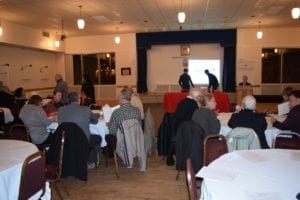Proposed legislation brings “fundamental reform” to OMB: Etobicoke-Lakeshore MPP Peter Milczyn

November 6, 2016 OMB Review Town Hall at Long Branch Legion Hall. Jaan Pill photo. Click on the image to enlarge it.
A previous post is entitled:
Next steps in OMB Reform are outlined in May 31, 2017 Government of Ontario message
I have been following with interest news reports regarding the OMB Reform legislation recently introduced at Queen’s Park.
I have read the text of the draft legislation.
The text does not make for easy reading, as the language does not closely resemble the language of everyday speech.
That being said, I do believe there is value in residents taking the time and effort to read the draft closely. It’s worth one’s while to determine what the draft legislation says.
There is also value in learning as much as can be learned, about what the proposed legislation, from those among us who have the capacity to explain the proposals in everyday language.
Three questions
Three questions have occurred to me with regard to the OMB Reform process:
- Will Ontario residents have access to word-by-word accounts of what is said at meetings of the Local Planning Appeal Tribunals?
- Will issues related to water drainage and flooding, associated with extreme weather events driven by climate change, be addressed?
- How will the legislation address the changes in the culture of OMB decision-making that has occurred over the past 25 years, as described by MPP Peter Milczyn at a November 9, 2016 Town Hall: Culture of COA and OMB decision-making has changed dramatically in 25 years: MPP Peter Milczyn
Question 1: Availability of word-by-word transcripts
With regard to the first question, the answer appears at the bottom of page 56 of the PDF of the draft document. The text in question reads: “Record: (2) All oral evidence submitted before the Tribunal shall be taken down in writing and, together with such documentary evidence and things as are received in evidence by the Tribunal, form the record.”
Question 2: Details related to climate change
I do not have a clear sense of how matters related to stormwater and flooding will be addressed when Local Planning Appeal Tribunals are made. From what I have observed at Etobicoke-York Committee of Adjustment meetings over the past year, the members of the latter committee have the view that matters related to stormwater and flooding are of no relevance, when topics related to “Minor Variances” are addressed. I look forward to learning more details, with regard to how the Tribunals will address these topics, in relation to local urban planning decisions.
Question 3: How will the “institutional drift,” that has occurred in relation to culture of OMB decision-making, be addressed?
By “institutional drift,” I refer to the changes, in the culture of decision-making, that occurs within organizations over time, in response to changes related to logistics associated with economic, social, and political processes.

May 2, 2015 Jane’s Walk: Spaghetti Junction – The Farewell Tour. Etobicoke-Lakeshore MPP Peter Milczyn is on the left, holding the microphone. Jaan Pill photo
According to a recent conversation with Etobicoke-York MPP Peter Milczyn, the issue of changes in culture will be addressed by the fact that a five-year review stipulation is built into the proposed OMB Reform legislation.
That is, after five years, a close look is required, to ensure that the legislation is working as it was intended, to address the situation that may be at hand, in the present moment.
MPP Milczyn notes that the proposed legislation involves a “fundamental reform” in how planning decisions will be made in Ontario.
The new test for the appropriateness of planning decisions will be a “compliance test.” Does the decision, that is under appeal to the Tribunal, comply with the province’s Growth Plan and Policy Statement, and the City of Toronto Official Plan?
MPP Milczyn adds that if the answers to these questions is yes, then the Appeal fails.
Scenario No. 1
[Please note: The following scenarios may (possibly) require some copy editing.]
Consider a condo project at Islington Ave. and Bloor St. as an example. The City might say that 30 storeys are allowable, with such-and-such a density, at the proposed site. The developer might say that 40 storeys is what is preferable, at some other density.
The City makes its planning decision, and the developer appeals. What follows? The developer could be told that City has made no error. Subjectively, the developer may want more height and greater density, but that does not comply with the province’s Growth Plan and Policy Statement, and the City of Toronto Official Plan.
Scenario No. 2
Imagine a situation in which the City is NIMBY-ish in its desires. Let’s say that the City only wants six storeys at a condo project at the intersection of two major arteries. In that case, let’s say the Applicant would be able to demonstrate that the proposed height is not in compliance with the province’s Growth Plan and Policy Statement, and the City of Toronto Official Plan.
In that case, the Tribunal would determine that the City’s proposal is not in compliance with the required criteria. The City would be told it has 90 days to correct its Application. After 90 days, the Tribunal could proceed to deal with the proposal on the basis of the compliance with the province’s Growth Plan and Policy Statement, and the City of Toronto Official Plan.

MPP Peter Milczyn outlines OMB Review at November 9, 2016 meeting at Long Branch Legion Hall. Jaan Pill photo. Click on the image to enlarge it.
Tribunal will not be a substitute decision-maker
MPP Peter Milczyn also notes that the Tribunal will not be an alternate or substitute decision-maker. The Appeal can be compared to the Appeal of a murder conviction in a Court of Law. As a rule, you don’t end up re-doing the whole trial. On the other hand, if some point of law does require it, in some cases the Appeal Court could indeed overturn the verdict, and order a new trial.
That, says MPP Milczyn, is the fundamental shift, in the proposed OMB Reform legislation. The Tribunal will serve as a “true Appeal Panel,” he explains. It will deal with compliance with policies.
Milczyn adds that certain Appeals will be prohibited. For example, on land where there is a transit station, a developer can try to persuade the city regarding a proposal, but once a decision is made by the City, it cannot be appealed.
Judson scenario
Under the new rules, the City’s decision with regard to the Judson operation on the west side of Mimico, is compliant with the City’s Official Plan. It would be very hard to overturn such a decision, once the proposed OMB Reform legislation has been enacted.
Town Hall meetings
MPP Milczyn will be hosting two Town Hall meetings in June, introducing the proposed legislation. One meeting will be in the north, one in the south.
Wood Bull LLP overview of proposed legislation
A post at its website notes that Wood Bull LLP “is a specialty practice law firm that focuses on municipal, planning and development law, with particular emphasis on the land development approvals process and municipal finance.”
A May 30, 2017 article at the latter site is entitled: “Province Introduces New Legislation to Overhaul Ontario’s Land Use Planning Appeal System.”
The article notes: “Wood Bull LLP will provide further detail and analysis on the proposed changes in the coming weeks.”
Comment from Richmond Hill Councillor David West
A June 5, 2017 article at the website of Councillor David West of Richmond Hill is entitled: “Ontario Municipal Board Reform – Finally.”
The article includes the following links:
Backgrounder: Ontario’s Proposed Changes to the Land Use Planning Appeal System (May 16, 2017)
A May 16, 2017 Toronto Star article entitled: “OMB reform praised as ‘bold’ boon to local democracy: Minister of Municipal Affairs Bill Mauro said the reforms mean an end to the ‘status quo’ planning dispute resolution process that has frustrated communities and city planners for decades.”
A May 18, 2017 CityNews article is entitled: “Proposed OMB changes could be good for environmental groups: Greenbelt Alliance.”

Leave a Reply
Want to join the discussion?Feel free to contribute!